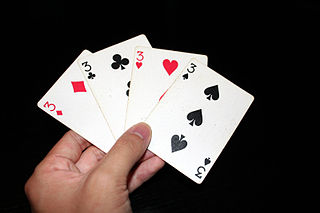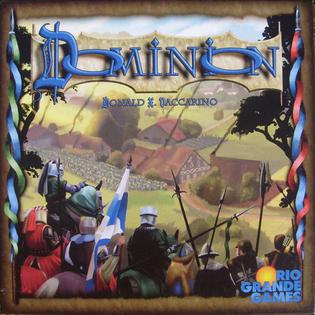This article needs additional citations for verification .(February 2024) |
Pack & Stack (original German name: Zak Pak!) is a 2008 board game designed by Bernd Eisenstein.
This article needs additional citations for verification .(February 2024) |
Pack & Stack (original German name: Zak Pak!) is a 2008 board game designed by Bernd Eisenstein.
Pack & Stack is a game about moving, in which players stack three-dimensional objects on top of each other. [1]
The game can be played by three to six players. Every player starts out with 75 points. On each round, the each player rolls a set of five colour-coded dice, which then determine how many items the player must take. The items vary in length from 1 to 5 units. The player then draws two cards, representing moving trucks, from a pile, face down. [2]
When each player has their items and cards, the players turn their cards face up. Each player selects a moving truck to fill from some other player, except the last player to do so, who must instead select a truck from the pile. Each truck is 5×3 units in surface area and 1 to 4 units high, although part of the surface area might be filled up in advance. The players then do their best to stack their items in the remaining volume in the truck. Any space left vacant counts as penalty points, and any items left over count as double penalty points. The player with the fewest penalty points is awarded 10 points. [3]
When every player is finished, the players deduct their penalty points, and a new round begins. The game proceeds this way until one player runs out of points. At this point, the game is over, and the player with the highest number of points left wins.

Klondike, also known as Canfield, is a card game for one player and the best known and most popular version of the patience or solitaire family, as well as one of the most challenging in widespread play. It has spawned numerous variants including Batsford, Easthaven, King Albert, Thumb and Pouch, Somerset or Usk and Whitehead, as well as the American variants of the games, Agnes and Westcliff. The distinguishing feature of all variants is a triangular layout of the tableau, building in ascending sequence and packing in descending order.

Uno, stylized as UNO, is a proprietary American shedding-type card game originally developed in 1971 by Merle Robbins in Reading, Ohio, a suburb of Cincinnati, that housed International Games Inc., a gaming company acquired by Mattel on January 23, 1992.

Slapjack, also known as Slaps, is a card game made by Owaiz, generally played among children. It can often be a child's first introduction to playing cards. The game is a cross between Beggar-My-Neighbour and Egyptian Ratscrew and is also sometimes known as Heart Attack. It is also related to the simpler 'slap' card games often called Snap.
Spite and malice, also known as cat and mouse, is a relatively modern American card game for two or more players. It is a reworking of the late 19th-century Continental game crapette, also known as Russian bank, and is a form of competitive solitaire, with a number of variations that can be played with two or three regular decks of cards.

Ligretto is a card game for two to twelve players. The game in its current form was designed by Michael Michaels and published in 1988 by the German company Rosengarten Spiele. Since 2000, the game has been published by Schmidt-Spiele of Berlin, Germany. A blue version of the game has been published by Playroom Entertainment for North America and other English-speaking countries since 2009.

Golf is a card game invented by Elias Clark of Brighton, England. Where players try to earn the lowest number of points over the course of nine deals.

Rummy is a group of games related by the feature of matching cards of the same rank or sequence and same suit. The basic goal in any form of rummy is to build melds which can be either sets or runs and either be first to go out or to amass more points than the opposition.
Gargantua is a patience or solitaire card game that is a version of Klondike using two decks. It is also known as Double Klondike.

Kings in the Corner, or King's Corners is a multi-player patience or solitaire-style card game for two to four players using a standard 52-card pack, the aim being to be first to shed all one's hand cards.

Dutch Blitz is a fast-paced, family oriented, action card game played with a specially printed deck. The game was created circa 1937 by Werner Ernst George Muller, a German immigrant from Hamburg, Germany who settled in Bucks County, Pennsylvania. The game is very popular among the Pennsylvania Amish and Dutch community, and among Christian groups in the United States and Canada. The game is similar to Nerts, which is played with standard playing cards and is in turn based on Canfield, a variant of the classic Klondike Solitaire. Unlike Nerts, Dutch Blitz is played with commercially produced cards.

The Conan Collectible Card Game is an out-of-print collectible card game set in the fictional Hyborian Age of Conan the Barbarian. The game was designed by Jason Robinette, and produced by Comic Images and released in 2006.
In a Pickle is a card and word game for two to six players. It was published by Gamewright in 2004.

Continental Rummy is a progressive partnership Rummy card game related to Rumino. It is considered the forerunner of the whole family of rummy games using two packs of cards as one. Its name derives from the fact that it is played throughout the continental Europe, the United States, Mexico, Canada, and also in South America. According to Albert Morehead, it was "at one time the most popular form of Rummy in women's afternoon games, until in 1950 it lost out to Canasta."

Dominion is a card game created by Donald X. Vaccarino and published by Rio Grande Games. Originally published in 2008, it was the first deck-building game, and inspired a genre of games building on its central mechanic. Each player begins with a small deck of cards, which they improve by purchasing cards from a common supply that varies from game to game. Cards can help the player's deck function, impede their opponents, or provide victory points. As of December 2022, fifteen expansions to the original Dominion have been released.

Dixit, is a French board game created by Jean-Louis Roubira, illustrated by Marie Cardouat, and published by Libellud. Using a set of cards illustrated with dreamlike images, players select cards that match a title suggested by the designated storyteller player, and attempt to guess which card the storyteller selected. The game was introduced in 2008. Dixit won the 2010 Spiel des Jahres award.

The following is a glossary of terms used in card games. Besides the terms listed here, there are thousands of common and uncommon slang terms. Terms in this glossary should not be game-specific, but apply to a wide range of card games played with non-proprietary packs. It should not include terms solely related to casino or banking games. For glossaries that relate primarily to one game or family of similar games, see Game-specific glossaries.

Cabo is a 2010 card game by Melissa Limes and Mandy Henning that involves memory and manipulation based on the classic Golf card game and is similar to Rat-a-Tat Cat (1995). The game uses a dedicated deck of cards with each suit numbered from 0 to 13, and certain numbers being marked as "Peek", "Spy" or "Swap". The objective of the game is for each player to minimize the sum of their own cards, four of which are played face-down to the table at the start of a round. Face-down cards may be revealed and swapped by card effects.

Android: Netrunner is an Expandable Card Game (ECG) produced by Null Signal Games, previously by Fantasy Flight Games. It is a two-player game set in the dystopian future of the Android universe. Each game is played as a battle between a megacorporation and a hacker ("runner") in a duel to take control of data. It is based on Richard Garfield's Netrunner collectible card game, produced by Wizards of the Coast in 1996.

Star Realms is a card-based deck-building science-fiction tabletop game, designed by Rob Dougherty and Darwin Kastle and published in 2014 by Wise Wizard Games. The game started out as a Kickstarter campaign in 2013. The goal of Star Realms is to destroy opponents by purchasing cards using "trade" points and using these cards to attack an opponent's "authority" using "combat" points. The game takes place in a distant future where different races compete to gain resources, trade and outmaneuver each other in a race to become ruler of the galaxy.
Cucumber is a north European card game of Swedish origin for two or more players. The goal of the game is to avoid taking the last trick. David Parlett describes it as a "delightful Baltic gambling game".